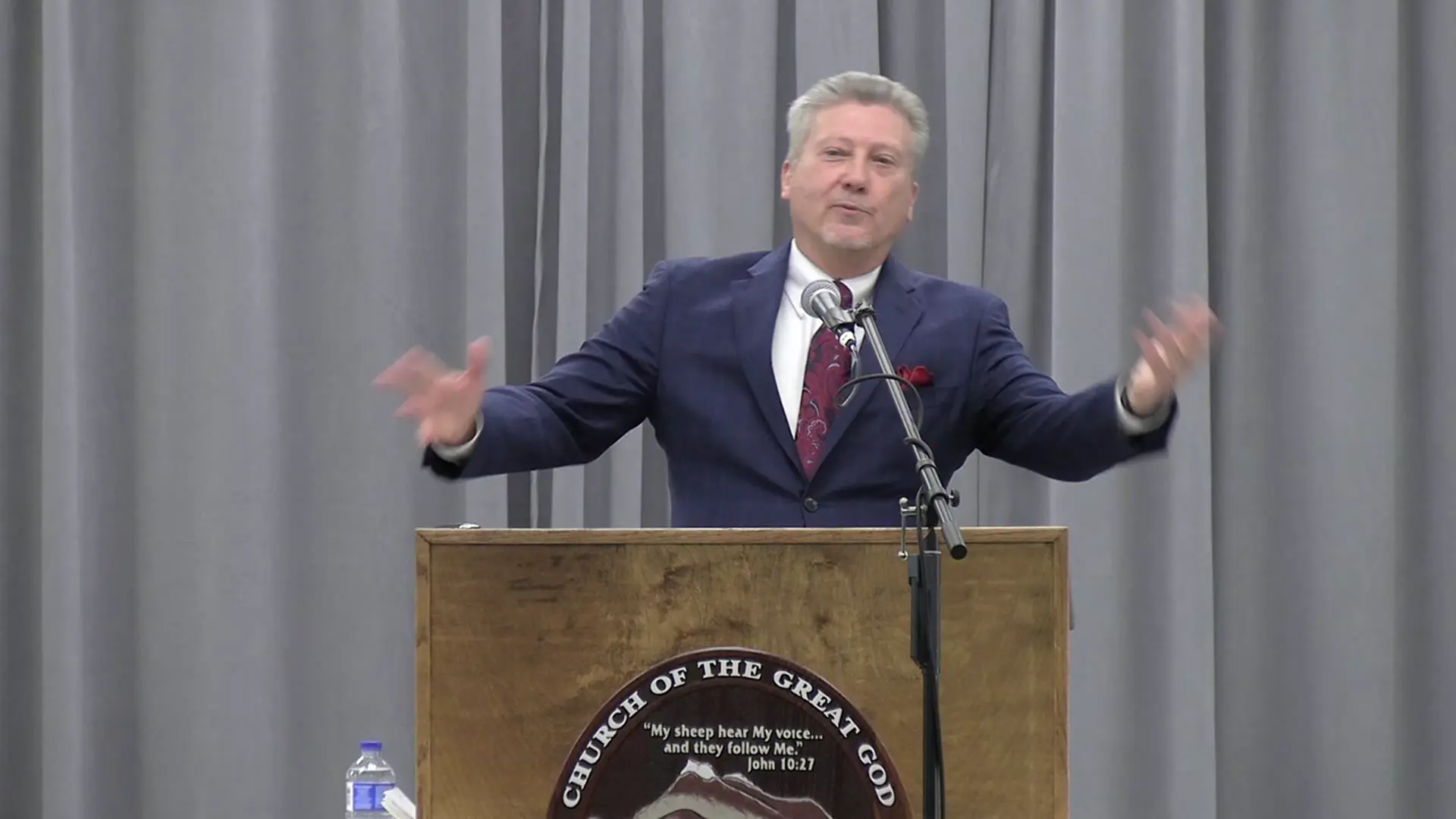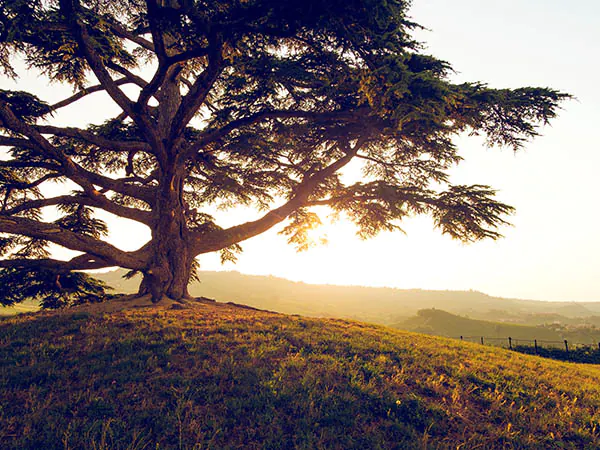The Eighth Day (Last Great Day) - Sermons, Bible Studies, Articles, and Essays
The Last Great Day
Feast of Tabernacles Sermon by John O. ReidThe Last Great Day holds a special significance as it encourages us during our departure from the Feast of Tabernacles. This day, planned by God the Father and the One who became Jesus Christ since the time of Adam and Eve, or perhaps even before, pictures an extraordinary event beyond human imagination. It represents a miraculous
The Last Great Day of Reconciliation
Sermonette by Bill OnisickGod did not create rebellion, but He did create free will, giving us a choice, which our carnal nature sabotages because it is enmity against God and His law.

Holy Days: The Eighth Day
Bible Study by Richard T. RitenbaughThe Last Great Day, the final festival in God's annual holy days, holds a profound significance as it looks forward to a time after the Millennium when a remarkable period of salvation will unfold. During this time, the majority of mankind—rich and poor, young and old, men and women—will be resurrected and given the opp
The Eighth Day
Sermonette by James BeaubelleThe seventh Millennium will be a time of rest, when the suffering we experience today will be gone, enabling preparation for the Great White Throne Judgment.
The Eighth Day (2019)
Sermonette by David C. GrabbeThe Eight Day (or Last Great Day) has little written about it, but the patterns of Scripture reveal much about the abundance of this holy day.
Lessons From the Eighth Day
Sermonette by David C. GrabbeThe Eighth Day, also known as the Last Great Day, holds profound significance as a holy day commanded by God to be kept sacred with a holy convocation. As outlined in Leviticus 23:36, on the eighth day, a sacred assembly is to be held, an offering made by fire to the Lord is required, and no customary work is to be done. This day,

Jesus in the Feasts (Part Six): The Eighth Day
Feast of Tabernacles Sermon by Richard T. RitenbaughIn the context of the holy days, the Eighth Day, also known as the Last Great Day, holds a unique significance in pointing us to Christ. In this day, He is our all in all, encapsulating everything we need. As part of the festival cycle, the Eighth Day follows the seven days of the Feast of Tabernacles and is marked by a holy convoc

The Fall Holy Days
Article by John ReissThe Eighth Day, as outlined in Leviticus 23:36, marks the final fall holy day and represents the concluding step in God's plan. After the Millennium, the thousand years of Christ's rule, all who have ever lived will be resurrected to physical life and given God's Spirit and understanding of His Plan. For a hundred years, they will
Are God's Holy Days To Be Kept Today?
Sermon/Bible Study by Martin G. CollinsThe Last Great Day, also known as the Eighth Day, is one of the seven annual holy days outlined in Leviticus 23, which are vital for understanding God's plan of salvation. These feasts, including the Last Great Day, were not only intended for ancient Israel but are firmly rooted in the New Testament as God's holy days, to be observ
The Great White Throne
Feast of Tabernacles Sermon by Richard T. RitenbaughThe Last Great Day holds profound significance as it represents events yet to unfold, requiring us to envision a future beyond our current experience. This day, often challenging to fully grasp, centers on the Great White Throne Judgment, a time when countless individuals will have their opportunity for salvation. Unlike the miscon
Being There
Sermonette by Mike FordThe Eighth Day, also known as the Last Great Day, holds profound significance as it pictures the second resurrection, a time when those not called by God in this life will have their opportunity. On this day, billions of people, most with no prior knowledge of God, will be resurrected and granted 100 years to learn and grow to beco

Be There!
Article by Mike FordThe Last Great Day represents the second resurrection, a time pictured by the Great White Throne Judgment, when billions of people who were not called by God during their earthly lives will rise to life. This includes individuals like my grandfather, who lived a full life without knowing God's purpose, yet will be given the chance
John 7:37 Examined (Part One)
Feast of Tabernacles Sermon by John W. Ritenbaugh (1932-2023)The Eighth Day, commonly referred to as the Last Great Day, holds a unique place among God's feasts and holy days, yet it remains unnamed in the Bible. Unlike other festivals clearly identified in Leviticus 23, such as Passover, the Days of Unleavened Bread, and the Feast of Tabernacles, the Eighth Day is mentioned without a specif

The Final Harvest
'Personal' from John W. RitenbaughThe Eighth Day, also known as the Last Great Day, holds profound significance for those who grasp its meaning. It addresses the perplexing questions surrounding the vast multitudes of humanity who live or have died without knowledge of God's way or a true understanding of Jesus Christ, the only name by which we must be saved. This
Eternal Responsibilities
Feast of Tabernacles Sermon by Martin G. CollinsThe Eighth Day, also known as the Last Great Day, is an integral part of the eight-day festival that includes the Feast of Tabernacles, dating back to the time of Moses and ancient Israel. This festival, filled with rejoicing, festivity, brotherhood, and thanksgiving, mirrors the way we observe it today, elevated to a spiritual pla
The Process of Righteous Judgment
Feast of Tabernacles Sermon by Martin G. CollinsThe Last Great Day, also known as the Eighth Day, pictures a profound period of judgment known as the Great White Throne Judgment, which occurs after the Millennium. During this time, free access to God will be open to all mankind for the first time in history. Revelation 20 outlines the sequence of events, including a massive seco
The Blind See
Feast of Tabernacles Sermon by Richard T. RitenbaughThe Eighth Day, also known as the Last Great Day, holds a significant place in the cycle of holy days, commemorating a time when the blind will see and be converted. This day, mentioned in Leviticus 23 as a Sabbath with a holy convocation, is often referred to simply as The Eighth Day throughout the Old Testament. It is linked to t
Death: The End of the Beginning
Feast of Tabernacles Sermon by Richard T. RitenbaughThe Last Great Day, also known as the Eighth Day, is a profound holy day that embodies God's grace and fairness toward all humanity. It anticipates a time of perfect justice when each person will have an opportunity for salvation under favorable conditions, free from the influence of the arch deceiver. God ensures the best possible
Do You Recognize This Man? (Part Seven)
Sermon by Richard T. RitenbaughThe Eighth Day, also known as the Last Great Day, is a sacred assembly following the seven days of the Feast of Tabernacles, treated as a holy day with no customary work to be done. It is not explicitly distinguished in the Old Testament beyond being called the eighth day, appearing as a conclusion to the Harvest Festival. In Levit
The Second Resurrection and Union With Christ
Feast of Tabernacles Sermon by Richard T. RitenbaughThe Eighth Day, also referred to as the Last Great Day, holds a significant place in the biblical framework as a holy day of profound meaning. In Leviticus 23, it is described as a Sabbath rest, a day for giving an offering and refraining from customary work, marking it as a sacred time of convocation. Though the Old Testament prov

Ecclesiastes Resumed (Part Thirty-Four): Ecclesiastes 9:2-12
Feast of Tabernacles Sermon by Richard T. RitenbaughThe Eighth Day, often seen as an extension of the Feast of Tabernacles, remains an enigma with little explanation in the Old Testament about its significance in God's grand plan of salvation. It is not until Revelation 20:11-13 that we find clear indication of its meaning, pointing to the Great White Throne Judgment period. This ti

Jesus and the Feast (Part Three): Light of the World
Feast of Tabernacles Sermon by Richard T. RitenbaughThe Eighth Day, also known as the Last Great Day, holds significant meaning within the context of God's appointed times and His plan for humanity. This day, distinct from the seven days of the Feast of Tabernacles, is recognized as a separate holy day marked by a sacred assembly and offerings, though the Old Testament provides scan
God of Our Salvation
Feast of Tabernacles Sermon by Richard T. RitenbaughThe Eighth Day, also known as the Last Great Day, holds profound significance for humanity as a time of ultimate salvation. This holy day, briefly mentioned in Leviticus 23 as a holy convocation following the Feast of Tabernacles, gains deeper meaning in the New Testament, particularly in relation to the Great White Throne Judgment
Benefits of the Third Resurrection
Feast of Tabernacles Sermon by Richard T. RitenbaughThe Eighth Day, also known as the Last Great Day, holds profound significance in God's plan as a time of immense spiritual outpouring and judgment. On this day, during the Feast, Christ stood and spoke of rivers of living waters, symbolizing the Holy Spirit that would be given without measure to those who believe in Him. This day r
Fall Feast Lessons
Sermon by John W. RitenbaughThe world will learn that God judges—that He has the ultimate decision over everything. After Satan is bound, God will bring about seven reconcilements.
An Abundant Spiritual Offering
Sermonette by David C. GrabbeThe number eight signifies a new start with abundance abundance following a period of time (a week, seven years, or a millennium) of preparatory activity.
John 7:37 Examined (Part Two)
Feast of Tabernacles Sermon by John W. Ritenbaugh (1932-2023)All of the events in John 8-10 occurred on the Eighth Day. Christ was crucified in 31 AD, and the postponement rules of the Hebrew calendar are accurate.
The End
Feast of Tabernacles Sermon by Richard T. RitenbaughNoah's flood was an end, the temple's destruction was an end, Christ's second coming will be an end, and the Last Great Day will be an end and a beginning.
Kings and Priests
Sermonette by James BeaubelleThe Eighth Day is a dramatic, pivotal moment in God's divine plan of salvation, symbolizing new beginnings and the final phase of God's redemptive work.

Judgment Is a Merciful Blessing
Feast of Tabernacles Sermon by Martin G. CollinsGod is patient and tender-hearted to late bloomers, forgiving sincerely repentant individuals, but will not budge an inch on rebellion or sin.
Psalms: Book Four (Part Three)
Feast of Tabernacles Sermon by Richard T. RitenbaughPsalms 105 and 106 describe the Great White Throne period, expressing the yearning desire to be included in His Kingdom and declaring God's praises.
An Abundance of Living Water
Feast of Tabernacles Sermon by Richard T. RitenbaughWater has great metaphorical significance on the Last Great Day of the Feast, symbolizing God's Holy Spirit given without measure.
The Light of the World
Sermonette by David C. GrabbeChrist's teachings on the Eighth Day revolved around light and darkness, and twice on that Holy Day He proclaimed that He is the Light of the World.
The Sabbath: Rest
Feast of Tabernacles Sermon by Richard T. RitenbaughThe Sabbath is an antidote to the weariness we experience. It recalls God's pausing after completing His physical creation, focusing on the spiritual creation.
Judgment According to Works
Feast of Tabernacles Sermon by Richard T. RitenbaughBecause God sees the content of our hearts, nothing escapes His attention. He mercifully judges over a lifetime of behaviors, not just isolated incidents.
God's Will in the End Time
Feast of Tabernacles Sermon by Richard T. RitenbaughGod does not like to inflict punishment on people, but because of sin, He is obligated to correct. But as quickly as God punishes, God restores and heals.
The Second Resurrection
Feast of Tabernacles Sermon by John W. RitenbaughGod has a timetable, carefully calculated to allow people to receive and respond to the truth at their best time for salvation, each in his own order.
A Vision of Eternity
Sermonette by Austin Del CastilloThough we currently dwell in a temporary fleshly tent, we will be ultimately clothed in a permanent spiritual body, able to see God the Father and Christ.
Why Trumpets?
Sermonette by James BeaubelleThe Feast of Trumpets depicts a time when angelic beings sound an alarm, warning God's saints to prepare to put themselves under His sovereign rule.
God and Self-Government
Feast of Tabernacles Sermon by Richard T. RitenbaughThe New Covenant, wherein God writes His law on the heart and gives His Spirit, empowers God's people to obey without the need for external control.